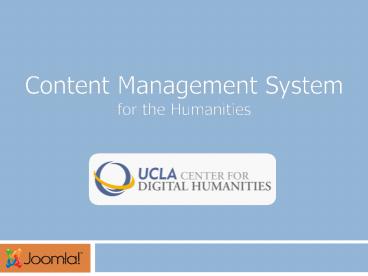Content Management System - PowerPoint PPT Presentation
1 / 13
Title:
Content Management System
Description:
... on the webpage with an interface that looks like Microsoft Word ... This makes site updates and changes much more efficient. Text, pictures, documents, etc ... – PowerPoint PPT presentation
Number of Views:64
Avg rating:3.0/5.0
Title: Content Management System
1
Content Management System for the Humanities
2
How do we currently update websites?
- Users have to go through a technical process of
downloading and uploading files to the server.
Dreamweaver to edit the pages
FTP for file transfers
3
How do we currently update websites?
- Faculty and staff often have to rely on their
DTA. - This often leads to outdated websites and faculty
pages. - The software needed to update these pages can be
expensive. - Such websites also have no dynamic content.
Blogging quick news or events posts
Calendar of Events
Podcasts
4
What is the purpose of a content management
system (CMS)?
- Helps organize, control, and publish a large body
of documents and multimedia content
Examples of document types
Word documents
Photos and images
Audio files
Video files
PDF files
5
What is the purpose of a content management
system (CMS)?
- Defined user roles in the content (editing,
posting, and so on) - Define workflow (the process of working on
content and publishing it)
Departments can define their own workflow. For
example
Author 1
Published on the Internet
Author 2
Departmental Website Coordinator
6
What is the purpose of a content management
system (CMS)?
- Website editors can easily update all the content
of the site. - Faculty, students, and staff can login to the
website and update their own biography and post
CVs, papers, and so on.
and can edit their page directly on the webpage
with an interface that looks like Microsoft Word
User logs in on the website
7
What is the purpose of a content management
system (CMS)?
- Separates the content from the formatting (the
look and feel of the website)
The content and design come together to form the
webpage that the visitors see.
Text, pictures, documents, etc
The CMS merges them on the fly
Live web page
Site layout and design
By changing the design, we dont need to touch
the content. This makes site updates and changes
much more efficient.
8
Why Joomla?
- Joomla is open source, meaning we can look at the
code and modify as needed (as opposed to closed,
proprietary systems) - Joomla is completely free to download and use
- Joomla is written in PHP, a widely-used
programming language, and relies on MySQL, a
widely-used free database software. CDH has
expertise in both. - Joomla has a large development community
- The cost of exit is low
9
Features
- Multilingual support
- Large number of extensions already available.
- Sophisticated editing interface with easy upload
of many types of files - Built-in search
10
Humanities Joomla Pilot
- Several departments have helped us pilot Joomla.
- Six are fully live, and two are in progress.
Department of Spanish Portuguese www.spanport.uc
la.edu
Far From Moscow New Music From
Russia www.moscow.ucla.edu
Chinese Language Program www.chinese.ucla.edu
Center for Jewish Studies www.cjs.ucla.edu
Digital Humanities www.digitalhumanities.ucla.edu
ALC 17th JK Linguistics Conference www.alc.ucla.ed
u/jk17
11
Humanities Joomla Pilot
Work-in-progress Department Websites Running on
Joomla
Department of Musicology
CDH Service Desk
12
Brief Demo of Joomla pilot websites and features
13
Next Steps
- Departments should tell us if they want to use
Joomla. (send an email to Joseph vaughan_at_ucla.edu
) - Departments should appoint a Departmental Website
Coordinator. - CDH will establish a timeline. We aim to convert
90 of sites this year.































